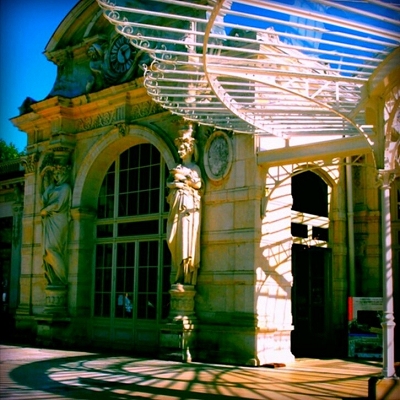
Like us on Facebook
PLACE NAMES


 
|
|
Vichy
|

| |
Vichy is a city in the Allier department in Auvergne in central France. It belongs to the historic province of Bourbonnais.
It is known as a spa and resort town and was the de facto capital of Vichy France during the World War II Nazi German occupation from 1940 to 1944.
The town's inhabitants are called Vichyssois. Up until the 18th century they were more properly known as les Vichois which stems from the Occitan name of the town, Vichèi. The writer Valery Larbaud uses the term Vicaldiens after the Ancient Roman name for the community.
With 80,194 inhabitants, Vichy's urban area is the second largest in the Auvergne region behind Clermont-Ferrand.
Vichy lies on the banks of the Allier River. The source of the Allier is in the nearby Massif Central plateau which lies only a few miles to the south, near the region's capital, Clermont-Ferrand.
The historical existence of volcanic activity in the Massif Central is somewhat visually evident. Volcanic eruptions have happened for at least 150,000 years, but all volcanoes there have been dormant for at least 112 years. Volcanic activity in the area is the direct cause of the many thermal springs that exist in and around Vichy.
Following the armistice signed on June 22, 1940, the zone which was not occupied by the Germans took the name of the French State (État Français) (as opposed to the traditional name, République française or French Republic) and set up its capital in Vichy on July 1, because of the town's relative proximity to Paris (4.5 hours by train) and because it was the city with the second largest hotel capacity at the time. Moreover, the existence of a modern telephone exchange made it possible to reach the whole world via phone.
On July 1, the Government took possession of many hotels. Six hundred members of the French Parliament (Appointed Members and Senators) would come to Vichy for the meeting of the Chambers. On the 9th and 10th, in the main auditorium of the Opera House, the members of Parliament voted for the end of the Third Republic. The republican system was abolished, and the French State, with Philippe Pétain at its helm as Head of State, replaced it. Only 80 of the 600 members of Parliament voiced their opposition. Starting from this date, Vichy would be, for more than four years, the capital of the French State. This government is often called the Vichy Regime. The preferred term is "Pétainist Regime" or "Regime of the French State." The term "Vichyste," which designates partisans of this regime, should not be confused with "Vichyssois" which designates the inhabitants of the city. The latter term is sometimes used erroneously to designate Pétain's supporters.
 Feel free to Email me any additions or corrections Feel free to Email me any additions or corrections
LINKS AVAILABLE TO YOUR SITE
| | |





